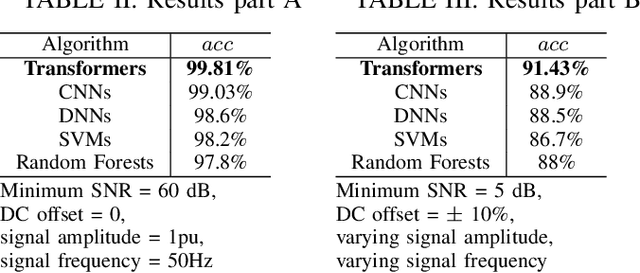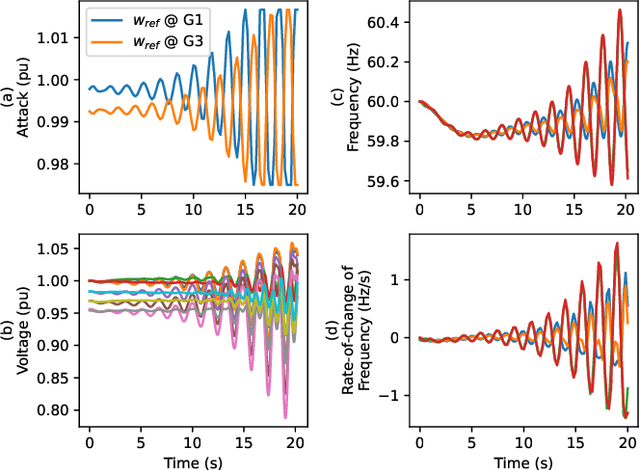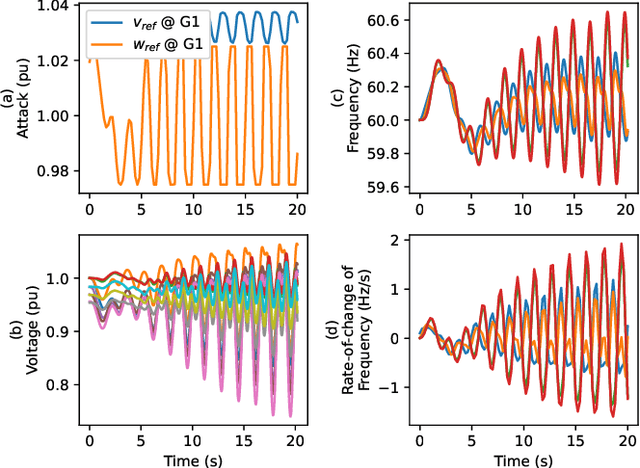Deepa Kundur
Large Language Models for Detecting Cyberattacks on Smart Grid Protective Relays
Jan 07, 2026Abstract:This paper presents a large language model (LLM)-based framework for detecting cyberattacks on transformer current differential relays (TCDRs), which, if undetected, may trigger false tripping of critical transformers. The proposed approach adapts and fine-tunes compact LLMs such as DistilBERT to distinguish cyberattacks from actual faults using textualized multidimensional TCDR current measurements recorded before and after tripping. Our results demonstrate that DistilBERT detects 97.6% of cyberattacks without compromising TCDR dependability and achieves inference latency below 6 ms on a commercial workstation. Additional evaluations confirm the framework's robustness under combined time-synchronization and false-data-injection attacks, resilience to measurement noise, and stability across prompt formulation variants. Furthermore, GPT-2 and DistilBERT+LoRA achieve comparable performance, highlighting the potential of LLMs for enhancing smart grid cybersecurity. We provide the full dataset used in this study for reproducibility.
A Kolmogorov-Arnold Network for Interpretable Cyberattack Detection in AGC Systems
Sep 05, 2025Abstract:Automatic Generation Control (AGC) is essential for power grid stability but remains vulnerable to stealthy cyberattacks, such as False Data Injection Attacks (FDIAs), which can disturb the system's stability while evading traditional detection methods. Unlike previous works that relied on blackbox approaches, this work proposes Kolmogorov-Arnold Networks (KAN) as an interpretable and accurate method for FDIA detection in AGC systems, considering the system nonlinearities. KAN models include a method for extracting symbolic equations, and are thus able to provide more interpretability than the majority of machine learning models. The proposed KAN is trained offline to learn the complex nonlinear relationships between the AGC measurements under different operating scenarios. After training, symbolic formulas that describe the trained model's behavior can be extracted and leveraged, greatly enhancing interpretability. Our findings confirm that the proposed KAN model achieves FDIA detection rates of up to 95.97% and 95.9% for the initial model and the symbolic formula, respectively, with a low false alarm rate, offering a reliable approach to enhancing AGC cybersecurity.
Large Language Model-Based Framework for Explainable Cyberattack Detection in Automatic Generation Control Systems
Jul 29, 2025Abstract:The increasing digitization of smart grids has improved operational efficiency but also introduced new cybersecurity vulnerabilities, such as False Data Injection Attacks (FDIAs) targeting Automatic Generation Control (AGC) systems. While machine learning (ML) and deep learning (DL) models have shown promise in detecting such attacks, their opaque decision-making limits operator trust and real-world applicability. This paper proposes a hybrid framework that integrates lightweight ML-based attack detection with natural language explanations generated by Large Language Models (LLMs). Classifiers such as LightGBM achieve up to 95.13% attack detection accuracy with only 0.004 s inference latency. Upon detecting a cyberattack, the system invokes LLMs, including GPT-3.5 Turbo, GPT-4 Turbo, and GPT-4o mini, to generate human-readable explanation of the event. Evaluated on 100 test samples, GPT-4o mini with 20-shot prompting achieved 93% accuracy in identifying the attack target, a mean absolute error of 0.075 pu in estimating attack magnitude, and 2.19 seconds mean absolute error (MAE) in estimating attack onset. These results demonstrate that the proposed framework effectively balances real-time detection with interpretable, high-fidelity explanations, addressing a critical need for actionable AI in smart grid cybersecurity.
Speech as a Multimodal Digital Phenotype for Multi-Task LLM-based Mental Health Prediction
May 28, 2025Abstract:Speech is a noninvasive digital phenotype that can offer valuable insights into mental health conditions, but it is often treated as a single modality. In contrast, we propose the treatment of patient speech data as a trimodal multimedia data source for depression detection. This study explores the potential of large language model-based architectures for speech-based depression prediction in a multimodal regime that integrates speech-derived text, acoustic landmarks, and vocal biomarkers. Adolescent depression presents a significant challenge and is often comorbid with multiple disorders, such as suicidal ideation and sleep disturbances. This presents an additional opportunity to integrate multi-task learning (MTL) into our study by simultaneously predicting depression, suicidal ideation, and sleep disturbances using the multimodal formulation. We also propose a longitudinal analysis strategy that models temporal changes across multiple clinical interactions, allowing for a comprehensive understanding of the conditions' progression. Our proposed approach, featuring trimodal, longitudinal MTL is evaluated on the Depression Early Warning dataset. It achieves a balanced accuracy of 70.8%, which is higher than each of the unimodal, single-task, and non-longitudinal methods.
Machine Learning-Based Cyberattack Detection and Identification for Automatic Generation Control Systems Considering Nonlinearities
Apr 12, 2025



Abstract:Automatic generation control (AGC) systems play a crucial role in maintaining system frequency across power grids. However, AGC systems' reliance on communicated measurements exposes them to false data injection attacks (FDIAs), which can compromise the overall system stability. This paper proposes a machine learning (ML)-based detection framework that identifies FDIAs and determines the compromised measurements. The approach utilizes an ML model trained offline to accurately detect attacks and classify the manipulated signals based on a comprehensive set of statistical and time-series features extracted from AGC measurements before and after disturbances. For the proposed approach, we compare the performance of several powerful ML algorithms. Our results demonstrate the efficacy of the proposed method in detecting FDIAs while maintaining a low false alarm rate, with an F1-score of up to 99.98%, outperforming existing approaches.
A Kolmogorov-Arnold Network for Explainable Detection of Cyberattacks on EV Chargers
Mar 04, 2025Abstract:The increasing adoption of Electric Vehicles (EVs) and the expansion of charging infrastructure and their reliance on communication expose Electric Vehicle Supply Equipment (EVSE) to cyberattacks. This paper presents a novel Kolmogorov-Arnold Network (KAN)-based framework for detecting cyberattacks on EV chargers using only power consumption measurements. Leveraging the KAN's capability to model nonlinear, high-dimensional functions and its inherently interpretable architecture, the framework effectively differentiates between normal and malicious charging scenarios. The model is trained offline on a comprehensive dataset containing over 100,000 cyberattack cases generated through an experimental setup. Once trained, the KAN model can be deployed within individual chargers for real-time detection of abnormal charging behaviors indicative of cyberattacks. Our results demonstrate that the proposed KAN-based approach can accurately detect cyberattacks on EV chargers with Precision and F1-score of 99% and 92%, respectively, outperforming existing detection methods. Additionally, the proposed KANs's enable the extraction of mathematical formulas representing KAN's detection decisions, addressing interpretability, a key challenge in deep learning-based cybersecurity frameworks. This work marks a significant step toward building secure and explainable EV charging infrastructure.
Enhancing Power Quality Event Classification with AI Transformer Models
Feb 22, 2024



Abstract:Recently, there has been a growing interest in utilizing machine learning for accurate classification of power quality events (PQEs). However, most of these studies are performed assuming an ideal situation, while in reality, we can have measurement noise, DC offset, and variations in the voltage signal's amplitude and frequency. Building on the prior PQE classification works using deep learning, this paper proposes a deep-learning framework that leverages attention-enabled Transformers as a tool to accurately classify PQEs under the aforementioned considerations. The proposed framework can operate directly on the voltage signals with no need for a separate feature extraction or calculation phase. Our results show that the proposed framework outperforms recently proposed learning-based techniques. It can accurately classify PQEs under the aforementioned conditions with an accuracy varying between 99.81%$-$91.43% depending on the signal-to-noise ratio, DC offsets, and variations in the signal amplitude and frequency.
Reinforcement Learning for Supply Chain Attacks Against Frequency and Voltage Control
Sep 11, 2023



Abstract:The ongoing modernization of the power system, involving new equipment installations and upgrades, exposes the power system to the introduction of malware into its operation through supply chain attacks. Supply chain attacks present a significant threat to power systems, allowing cybercriminals to bypass network defenses and execute deliberate attacks at the physical layer. Given the exponential advancements in machine intelligence, cybercriminals will leverage this technology to create sophisticated and adaptable attacks that can be incorporated into supply chain attacks. We demonstrate the use of reinforcement learning for developing intelligent attacks incorporated into supply chain attacks against generation control devices. We simulate potential disturbances impacting frequency and voltage regulation. The presented method can provide valuable guidance for defending against supply chain attacks.
Implicit Feedback Deep Collaborative Filtering Product Recommendation System
Sep 08, 2020



Abstract:In this paper, several Collaborative Filtering (CF) approaches with latent variable methods were studied using user-item interactions to capture important hidden variations of the sparse customer purchasing behaviors. The latent factors are used to generalize the purchasing pattern of the customers and to provide product recommendations. CF with Neural Collaborative Filtering (NCF) was shown to produce the highest Normalized Discounted Cumulative Gain (NDCG) performance on the real-world proprietary dataset provided by a large parts supply company. Different hyperparameters were tested for applicability in the CF framework. External data sources like click-data and metrics like Clickthrough Rate (CTR) were reviewed for potential extensions to the work presented. The work shown in this paper provides techniques the Company can use to provide product recommendations to enhance revenues, attract new customers, and gain advantages over competitors.
 Add to Chrome
Add to Chrome Add to Firefox
Add to Firefox Add to Edge
Add to Edge